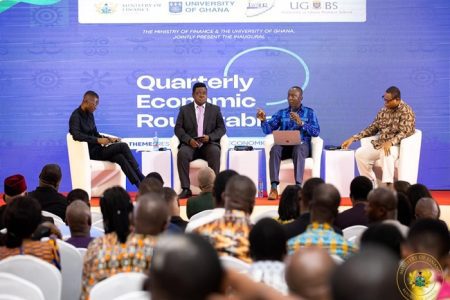The inaugural quarterly Economic Roundtable forum, themed “Restoring Macroeconomic Stability,” saw key speakers emphasize the urgent need for the Ghanaian government to ensure strict fiscal discipline to secure long-term macroeconomic stability.
The event, which gathered seasoned economists, government officials, policy think tanks, and academia, was marked by insightful discussions on addressing Ghana’s economic challenges.
Dr. Nii Kwaku Sowa, the keynote speaker and Country Director of the International Growth Centre, underscored Ghana’s historical struggle with sustained macro stability.
He highlighted persistent issues such as ballooning budget deficits, soaring debt levels, and volatile exchange rates.
Dr. Sowa critiqued the government’s frequent reliance on International Monetary Fund (IMF) bailouts, comparing them to emergency surgeries that offer only temporary relief.
Instead, he advocated for sustainable, long-term solutions, emphasizing the need to rectify inherent weaknesses in Ghana’s economic framework to boost revenue generation effectively.
“There are too many exemptions, particularly in the mining and construction industry. Someone wants to establish a company in your country, and then you give them a 10-year tax holiday.
What do you gain by allowing them to establish a company here?” Dr. Sowa questioned.
He called for prudent fiscal management, especially during election years, to avoid unbudgeted spending that often characterizes government expenditure during such times.
Dr. Sowa also stressed the impact of unforeseen events, like the COVID-19 pandemic and social and political issues, on the economy.
He called for improved efficiency in revenue collection without imposing additional taxes, noting that the current tax system heavily burdens businesses. Additionally, he urged better resource allocation to address budget imbalances and outlined various deficit financing strategies while cautioning against over-reliance on borrowing.
Madam Osei-Asare, Minister of State at the Ministry of Finance, acknowledged Ghana’s significant economic challenges but also pointed to opportunities for lasting reforms and change.
She noted recent volatility in key economic indicators, including high inflation, currency depreciation, and wide fiscal deficits exacerbated by external factors like global commodity price fluctuations and the COVID-19 pandemic.
Despite these challenges, she highlighted positive trends such as robust economic growth averaging 4.7% in Q1 of 2024, driven by industry, agriculture, and the services sector.
Inflation fell to 23.1% in May from 25% in April, marking the lowest rate since March 2022.
The exchange rate has stabilized since 2023, and recent pressures on the cedi are being contained.
Additionally, gross international reserves are improving, fiscal consolidation is holding, and public debt accumulation is declining following the successful completion of the debt restructuring program.
“The foundation of macroeconomic stability is fiscal discipline. We are committed to implementing stringent fiscal policies to reduce deficits and manage public debt sustainably,” Madam Osei-Asare emphasized.
She stressed the importance of controlling inflation to protect the purchasing power of Ghanaians and encouraged private investment in key sectors such as agriculture, manufacturing, and technology.
She also highlighted the need for a stable financial sector, regulatory reforms to bolster the resilience of financial institutions, and collective action and strategic policymaking to restore macroeconomic stability.
Professor Gordon A. Awandare, Pro Vice-Chancellor of the University of Ghana, called for the development of indigenous solutions to ensure long-term macroeconomic stability.
He emphasized the critical role a stable macroeconomic environment plays in fostering business innovation, expansion, and investment.
While acknowledging some positive outcomes of the recent IMF program, such as the reduction in inflation rates, Professor Awandare pointed to ongoing challenges, including persistent pressure on the cedi and unplanned expenditures during election cycles.
Professor Awandare urged policymakers, economists, and researchers to utilize their comprehensive understanding of Ghana’s economy to devise effective solutions.
He emphasized the importance of leveraging internal resources and expertise to craft sustainable economic strategies, reducing dependency on external assistance. He praised the collaboration between the government and the University of Ghana, noting that the involvement of the university’s experts is essential in formulating effective economic policies and fostering economic resilience and stability.
The forum concluded with a call for improved fiscal discipline, efficient revenue collection, and strategic investments to enhance economic output and reduce the deficit, all crucial steps towards achieving sustained macroeconomic stability for Ghana.
- Friday, April 4, 2025 Newspaper Headlines - 4 April 2025
- Blewett: MTN CEO, a pilot, author, chartered accountant, marathon runner and many more - 3 April 2025
- MTN Ghana launches Y’ello Ladies Network - 3 April 2025

